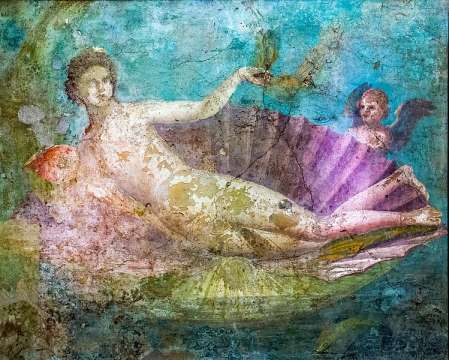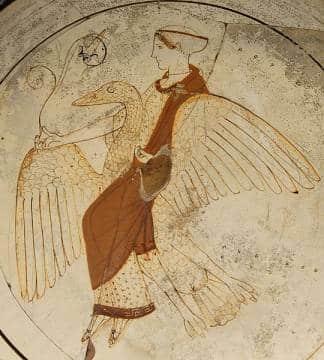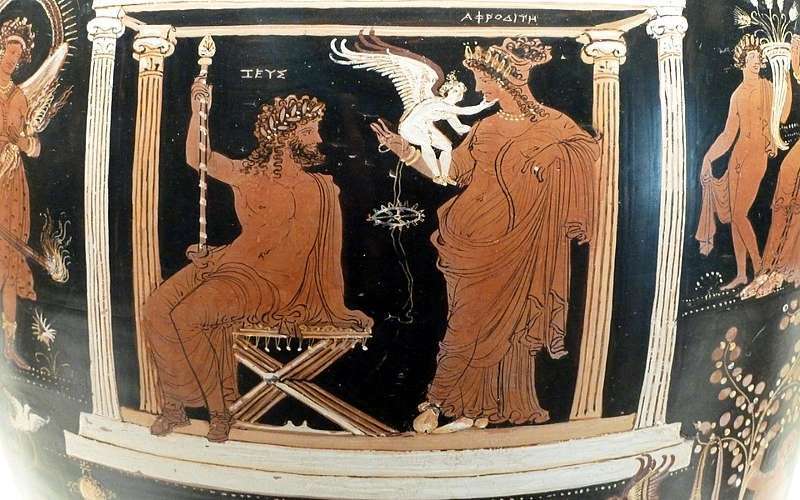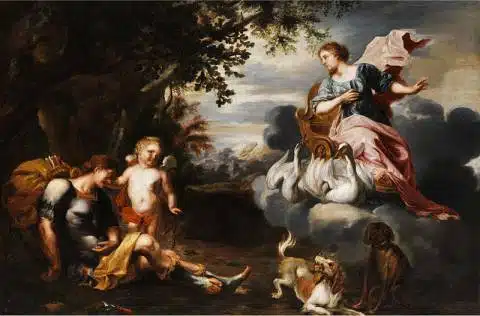The Greek goddess Aphrodite, the original “Golden Girl,” perfectly attired for the occasion in a simple string of pearls and a couple of strategically placed scallop shells, stepped out of the ocean on the island of Cypress and set the ancient world on its ear.
Aphrodite, the ancient Greek Olympian goddess of romantic love, had finally arrived! Never had there been such sensual beauty and impeccable taste. The other Greek goddesses now had their work set out for them… a new standard had been set, and the world would never be the same.
Henceforth, there would be candlelit dinners, heart-rending arias in operas, high-heeled shoes, and bright red lipstick. The romance was here, and planning to stay…
The Birth Of Aphrodite

It is unclear how the Greek goddess Aphrodite (also known as the Roman goddess Venus) came to be “sea-born.” One legend was that Aphrodite was the daughter of the Titan Uranus, formed from his genitals that had been severed and tossed into the sea by his son Cronus who was in the process of usurping his father’s throne.
What is certain is that her arrival caused quite a stir! Every Greek god and goddess was dying to meet her. The Horae (Hours) welcomed her to step ashore and adorned her with the finest gold ornaments and cloth, then brought Aphrodite to Mount Olympus to present her to Zeus and the other gods and goddesses.
Aphrodite’s Marriage To Hephestus
Zeus instantly realized that this captivating creature could become the source of all sorts of trouble… her radiance stirring every man’s passion and leading to constant fighting for her attention. To head off this possibility, Zeus decided she must be married at once (“taken off the market,” so to speak) and awarded the goddess to his son, Hephaestus, god of the forge.
It goes without saying that Hephaestus must have thought himself the luckiest man alive, especially since he was lame and “no great looker” himself. But he was reliable and hard-working.
Overjoyed with his good fortune in acquiring this stunning bride, Hephaestus did his best to please Aphrodite, designing and creating for her the most beautiful jewelry and furniture that had ever been seen.
He even went so far as to make Aphrodite a magical golden girdle that made her irresistible to men when she wore it. What could he have been thinking? This one had to be the worst mismatch of all the imaginable pairings of Greek gods and goddesses. Needless to say, their marriage had its ups and downs.
Aphrodite, the goddess that she was, felt she had married below her class since Hephaestus was decidedly “blue collar” even though he was a god… he was not at all what she, with her impeccable taste, had in mind. Aphrodite insisted upon an open marriage and indulged in numerous love affairs with both mortals and other gods.
Except for a few occasions when he was overwhelmed with jealousy or resentment, Hephaestus seemed to accept this arrangement, happy just to have and hold her when he could. Indeed, their marriage seemed companionable, with little passion perhaps, but little conflict as well.
Aphrodite’s Relationship With Other Gods
It was as if everyone recognized that Aphrodite had one gift and one gift only… to make love. And that one gift was so special that no one seemed to resent it. While all the other gods and goddesses had lengthy lists of divine duties to perform, the goddess Aphrodite was assigned only one… to bring love into the world.
Athena once caught Aphrodite weaving and reprimanded her for encroaching upon Athena’s area of responsibility. Aphrodite quickly apologized and vowed never to do any work again!
Although they were envious of her beauty and exciting but easy life, other women weren’t usually jealous or resentful of her charms. Although none were what could be called really close friends, they found her to be quite friendly and extraordinarily generous.
She even went to the extent of loaning Hera her magic girdle to help her keep Zeus’ wandering eyes where they belonged. The goddess Aphrodite was always ready to help both the deities and mortals win the loves they sought.
The Parallels Between Aphrodite, Venus, and Other Goddesses
Venus was the ultimate multitasker! She was also known as the Venus Verticordia, goddess of chastity in women (despite her numerous randy affairs with gods and mortals). As well as Venus Victrix, the goddess of victory in war, and also a nature goddess, associated with gardens and the arrival of spring.
When her son Aeneas fled Troy and founded the Roman race, Venus became known as the divine ancestor of the Roman people (the Venus Genetrix) and was treated with special honor.
Venus had many identities before she came to Rome –- Inanna, Ishtar/Astarte, and the Greek goddess Aphrodite. She had been recognized since the beginning of time as the brightest “star” in the heavens, except for the Sun.
The primordial triple goddess venus
The primordial Venus (Inanna, Ishtar, and Astarte) was a triple goddess – the morning (and evening) star represented her as the maiden who rose every morning, renewed in her youthful beauty, then waxing into her fullness of motherhood—next, becoming the crone, gradually waning in her power and strength but planting the seed of wisdom for the next cycle as she faded into the darkness of eternal night.
Because of her association with love and with feminine beauty, the Roman goddess Venus has been a favorite subject in art and poetry. To this day, she is a cultural icon of love and beauty, a reminder of the awesome power of female radiance and beauty.
Aphrodite’s Love Affairs
The Greek goddess Aphrodite, however, is best known for her own love affairs, which were numerous and varied and resulted in many offspring by her various lovers. Her most notable lovers were the gods Ares, Dionysius, Hermes, Poseidon, and the mortal, Adonis.
You’d think the other Greek goddesses would have been green with envy, but the willingness of the community to suspend their norms for the goddess Aphrodite is clear. Her flagrant affair with Ares, the god of war, was obvious to all and the cause of much embarrassment for her husband. Hephaestus fashioned an invisible net made of bronze and captured them in it while they were in bed together.
Hauling the pair in front of a jury of the Olympians, he demanded their punishment. Reluctant to get involved, the court instead chided Hephaestus for being silly and giving Aphrodite an outfit that rendered her irresistible in the first place!
The Love Story With Adonis
Although the goddess Aphrodite seldom seemed very serious in her affairs, one love caused her great suffering. She had begged Adonis, her beloved mortal, to give up the dangerous sports he enjoyed because she could not bear to lose him.
But Adonis ignored her advice and was killed by a wild boar while hunting. Aphrodite heard his cries when he died and hastened to his side in her swan-drawn chariot. She cursed the Fates that had ordained his death and, with Adonis still in her arms, turned the blood drops that fell from his wounds onto the soil into windflowers, also known as the short-lived anemone, as a memorial to their love.
Aphrodite’s Children
Aphrodite’s most famous son was Eros, the god of love, who helped her with her work. A talented archer, his job was to shoot arrows dipped in Aphrodite’s love potion. Upon which the unwitting victims would fall madly in love with the next person they saw. Many of the great love stories began this way, but many respectable homes were also broken up.
The Other Side Of The Coin
Although she was most often loving and generous, Aphrodite could also be quite malicious and vindictive. She insisted upon being given the honor she felt was due her and was quick and harsh in punishing those who weren’t sufficiently appreciative of her efforts. Ares, Medea, Psyche, and Atalanta, to name but a few could attest that the Greek goddess Aphrodite’s power was immense.
Often the punishments rendered by the goddess Aphrodite, though severe, held important lessons embedded within them. These were lessons that sparked growth and ultimately improved the life or extended the vision of the person she was punishing, as in the case of Psyche.
Legacy
The influence of the Greek goddess Aphrodite can be seen as generative, far beyond that of romance, love, or desire alone. She is associated with the life-giving sea. Just as the waves lapping on the shore refresh and renew the beach, Aphrodite brings us hope and awareness of the transforming power of love and beauty.
Goddess Symbols And Sacred Objects Of Aphrodite
Goddess symbols, individualized for each goddess, were incorporated into the worship of the ancient goddesses. They were often worn as jewelry and also used in the household decor as talismans to seek the goddesses special gifts, blessings, or protection. Numerous goddess symbols have survived in statuary and other works of art.
Many of the goddess symbols came from the legends surrounding a specific goddess and were “characters” in her story. Other goddess symbols were derived from the rituals used in the ancient rites of worship of these pagan goddesses.
Aphrodite’s goddess symbols are often those associated with her spectacular entrance from the sea. It is unsurprising that many of our ikons representing love, passion, and romance are derived from the ancient goddess symbols of Aphrodite.
General
The scallop shells and other seashells are often used to represent Aphrodite. According to one legend she was born from the sea foam and emerged standing on a scallop shell.
Her other symbols are mirrors, golden apples, the Evening Star (planet Venus), the number 5, the ocean, and the triangle.
Animals
It is said that dolphins swam around Aphrodite’s ankles when she was born. This is why they are often used as her symbol. They also symbolize joy, love, elegance, transformation, salvation, and altruism.
Other animals that symbolize Aphrodite are swans, doves, sparrows, bees, and goats.
Plants
Rose (especially any fragrant rose) symbolizes love, beauty, and elegance in many cultures worldwide. It makes no wonder that this beautiful plant is chosen as Aphrodite’s symbol as well.
Her other plant symbols include quince, myrtle, mint, grape (fruit, leaves, and vines), apples, artichokes, laurel, ash, and poplar trees.
Perfumes/Scents
Aphrodite’s beauty was intoxicating for gods and mortals alike, and it is natural that the scents symbolizing her should also be intoxicating. One such scent is stephanotis, with its perfect combination of floral and musk scent notes.
Other perfumes and scents that perfectly capture Aphrodite’s essence are musk, verbena, vanilla, incense, vervain, and roses.
Goddess Jewelry
There are many reasons why you might want to keep a healing crystal or stone close to you. Getting closer to your goddess by wearing her color or crystal is a great one. That they also look great as jewelry only makes it so much better!
Here is a guide to crystal jewelry you hopefully will find helpful. In it is a list of 30+ crystals and links to some really great looking jewelry with that crystal or stone. Enjoy!
Gems and Metals
Pearls symbolize Aphrodite because, after all, she is also associated with the seashells that make those pearls. Pearls are elegant, beautiful, and sophisticated, just like Aphrodite.
Her other symbols are gold, aquamarine, rose quartz, jade, sapphire, silver, and copper.
Colors
Red and pink are colors that are associated with love, beauty, and femininity. Those are definitely Aphrodite’s characteristics, and that’s why these two colors are used as Aphrodite’s symbols.
Other colors that symbolize Aphrodite are violet, silver, aqua, pale green (seafoam), and any shade of light blue.
Embracing the Call of Aphrodite: Recognizing Her Presence and Cultivating a Sacred Connection
Have you ever experienced an intense attraction to love, beauty, or sensuality and wondered if it’s more than just a fleeting feeling? For many spiritual seekers, the goddess Aphrodite may be extending an invitation to connect. Discover how to recognize the signs of her calling, invoke her presence, and cultivate a meaningful relationship with this enchanting Greek goddess.
How to know if Aphrodite is calling you
One way to recognize Aphrodite’s call is through experiences related to love and beauty. Encounters with stunning flowers, art, or feelings of affection may be signs. Pay attention to any symbols of love and sensuality that appear in your life, as Aphrodite often communicates through these manifestations.
Dreams and visions are another way Aphrodite may reach out. Dreams featuring her or her symbols, like roses, doves, or seashells, can be significant. Similarly, visions of warm, golden light might signal her presence.
Finally, observe synchronicities in your life. Repeated encounters with her symbols, or a strong attraction to her stories and mythology, can indicate that Aphrodite is calling you. These patterns may seem coincidental, but they’re worth noting.
Invoking Aphrodite
To call upon Aphrodite, create an inviting space filled with beautiful, sensual elements. Incorporate her symbols, such as roses, doves, or images of her into your chosen area. This will help establish a connection with the goddess.
During your ritual, light candles, preferably pink or red, as they represent love and passion. Offer symbols of Aphrodite, like flowers, seashells, or even written intentions. These offerings demonstrate your dedication and respect for her.
In meditation, focus on your breath and clear your mind. Visualize Aphrodite, her symbols, and the energy she embodies. Quietly ask for her guidance, and be open to any insights that may arise during your meditation.
Signs that Aphrodite is present
Recognizing when Aphrodite is with you is essential to deepening your connection with her. The goddess often manifests her presence in various ways, from emotional sensations to visual cues. Here are six signs to help you identify when Aphrodite is near:
- Emotional sensations: Feelings of love, warmth, or heightened sensuality can indicate her presence.
- Physical reactions: Sudden warmth, tingling sensations, or gentle caresses may signal she’s near.
- Visual cues: Flashes of golden light, rose petals, or glimpses of her symbols can be signs.
- Auditory cues: Hearing whispers, soft music, or gentle cooing of doves may suggest her presence.
- Nature occurrences: Unusual encounters with doves, roses, or other symbols of love can be a signal.
- Intuitive connection: A strong sense that Aphrodite is with you, even if you can’t pinpoint why, can be a sign of her presence.
Cultivating a relationship with Aphrodite
To build a deeper connection with Aphrodite, establish a consistent practice of meditation, prayer, or ritual to honor her. Make regular offerings, such as on Valentine’s Day or during the new moon, to demonstrate your commitment to the goddess.
Embrace her values by cultivating love, beauty, and sensuality in your life. Cherish and nurture relationships, both with yourself and others, as these aspects are central to her being. Aligning your life with her principles will help deepen your connection to her.
Lastly, study her mythology and history. Read about Aphrodite and her place in Greek mythology, and engage with others who share your interest.
Meditations To Invoke The Goddess Aphrodite
Do you want to honor and strengthen your own goddess type? Do you want to recognize your missing goddess type? Try these meditations:
- Aphrodite, let me be like you and share my joy and laughter with others to help them celebrate life!
- Great Goddess, help me know and respect the powers of my femininity today.
- Your joy is infectious, Aphrodite. Help me to share it with others.
- Great Goddess, help me to remain centered and emotionally available to others.
- Goddess, guide me to friends who add fun and lightheartedness to my life.
- I call on you, Aphrodite, to help me develop my true talents by accepting who I really am.
- Aphrodite, I join you in taking delight in the success and accomplishments of others.
- Great Goddess, help me celebrate my feminine power today.
- Thank you, Aphrodite, for helping me to be friendly, optimistic, and cheerful today.
- Goddess of Love, help me learn to love my body and to treat it with great care.
- Goddess, I reaffirm that I am a sensual being.
- Goddess of love, help me to keep my environment peaceful and harmonious today.
- Aphrodite, help me find ways to overcome displeasure with my own body and learn to love and enjoy it.
- Goddess of love, please remind me that I don’t have to have a partner to be in love, that I can be happy in love with life itself.
- Aphrodite, remind me today that, like you, I am caring and have a good heart.
- Share your ability to recover from setbacks quickly with me so that I can move forward to the next challenge in my life.
- Aphrodite, show me how to release the limits I impose on myself.
- Aphrodite, as the goddess of love, help me to take in the love others offer me.
Want To Bring More Aphrodite Qualities Into Your Life?

Everything you do to nurture your own sensual enjoyment of life will help enlarge the influence of Aphrodite. Some suggestions follow:
- Slow down. Take your time. Rushing can make it difficult to be sensual and caring.
- Permit yourself to feel beautiful, sensual, and loving. Without feeling guilty, make the time to do those things that delight and please you.
- Participate in some kind of bodywork (any kind, from aerobics to massage) to increase your awareness of your body and its sensations. Find a type that you really enjoy, and make the most of it!
- Practice focusing your attention on someone else, listening to them with your heart and mind. Don’t tune out or drift off into a daydream. Who knows, you may even learn things that will open new doors for you!
- Dress up, and wear something sensual, if not downright sexy! Even if it’s just bright red panties under your “dress for success” navy business suit.
- Don’t be afraid to speak your mind and let everyone else know what pleases you (and what doesn’t). Everyone knew where they stood with Aphrodite, as they should with you.
- Turn your bathroom into a pleasant spa. Stock the bath with bath oils and scented candles, the thickest towels you can afford, and fill it with music. And don’t forget a few seashells to remind you of Aphrodite’s presence!
- Work on becoming more trusting, even if it means risking rejection. Reach out and let others know how you feel about them.
- Surround yourself with Aphrodite’s symbols. Dress in her colors, and think of her appreciatively as you put on pearl earrings and dab on the scent of roses!
Let the symbols of Aphrodite surround you, and in addition to the suggestions above, custom pins might be a great idea.
You can design your own patterns, text, colors, etc. for Aphrodite. Then decorate your clothes, hat, bags, etc. Let Aphrodite’s influence surround your daily life and give you positive power.
Other Goddesses
If you enjoyed this post we are sure you will enjoy getting to know some of the other goddesses we also write about. You can find the complete list of goddesses sorted across regions and religions here.
Featured Image Credit: Dave & Margie Hill / Kleerup from Centennial, CO, USA, CC BY-SA 2.0, via Wikimedia Commons



